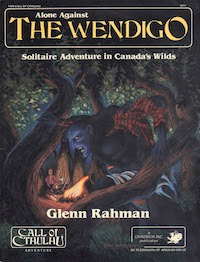Retrospective: Alone Against the Wendigo

I've mentioned before that I'm really quite fascinated by the concept of solo roleplaying games and solitaire adventures. I don't have a lot of experience with either of them, aside from my teenage forays into the Fighting Fantasy and related series. From what I understand, they've made a big comeback since the late unpleasantness, so much so, in fact, that quite a few RPGs now include explicit rules for playing the game alone.
Consequently, I missed out entirely on Chaosium's forays into this genre back in the early to mid-1980s, starting with SoloQuest for RuneQuest in 1982. A few years later, the company decided to expand the experiment to include Call of Cthulhu. Given that most Lovecraft stories typically involve a single protagonist, this makes the concept of a solitaire adventure very well suited to its source material, at least in principle.Published in 1985, Alone Against the Wendigo is the first of two solitaire adventures for Call of Cthulhu. Written by Glen Rahman, perhaps best known for the fantasy boardgame, Divine Right, which he co-designed with his brother, Kenneth, the scenario puts the player takes in the role of Dr L. C. Nadelmann. Nadelmann's initials can stand for either Lawrence Christian or Laura Christine, depending on whether the player wishes to play a man or a woman. Dr Nadelmann is a Miskatonic University anthropologist leading a six-person expedition into the Canadian wilderness to investigate tales concerning a monstrous being, the Wendigo. The adventure begins with the assembling of the expedition and the journey northward into the wilds of Northern Ontario, a place of vast snow-covered forests, ancient legends, and unsettling silence. As the days progress, the expedition begins to unravel. Strange noises are heard in the night. Members disappear. The weather turns deadly. In the growing cold and fear, the line between reality and madness begins to blur. Ultimately, Nadelmann must survive not only the physical dangers of the wilderness but also unravel the truth about the Wendigo, an entity tied to cannibalism, madness, and the insatiable hunger of the void.
Like all solitaire adventures, Alone Against the Wendigo sought to provide an experience of playing a RPG, in this case Call of Cthulhu, to players who didn’t have regular gaming groups. How well it succeeded in this is difficult to say objectively. My own experience with solo adventures is that they're really their own thing, distinct both from traditional adventures and from literature, even though their format draws from both. In the case of this particular scenario, which I played through in preparation for this post, I would say that it does an adequate job of conveying a mix of isolation, existential dread, and Mythos-inflected horror. Its remote, frozen wilderness setting does a lot of the heavy lifting in terms of tone, creating a believable and menacing backdrop that mirrors the psychological disintegration of the player.
Like every solitaire adventure with which I am familiar, Alone Against the Wendigo consists of a series of numbered paragraphs that the player navigates in response to choice and the results of dice rolls. Some of the latter are skill rolls (e.g. "Try a Psychology roll. If you succeed, go to –27–; if you fail, go to –29–."), but some are simply random (e.g. "Roll a die; even go to –4–; odd, go to –5–."). This gives the scenario a decent amount of replayability, with branching narratives, multiple choices, outcomes, and side paths. Different decisions, like what gear to bring, how to interact with team members, where to explore, not to mention the aforementioned dice rolls, can thus radically alter the experience. In that respect, I think Alone Against the Wendigo is pretty good.
The adventure's integration of Call of Cthulhu mechanics, like skill and Sanity rolls are handled with a fair degree of elegance. Playing through the scenario still feels like you're playing Call of Cthulhu rather than some inferior imitation of it. That's an impressive feat in itself and I appreciate the care with which the rules were employed here. To be fair, Call of Cthulhu is a pretty mechanically simple game, especially when compared to, say, RuneQuest, but, even so, I think Rahman did a solid job here in translating its gameplay to a solo environment.
Aside from the inevitable limitations of the solitaire format – no game book, no matter how lengthy, could provide for every possibility available in face-to-face play – the main problems with Alone Against the Wendigo, in my opinion, are its underdeveloped NPCs. While all of the expedition members accompanying Dr Nadelmann have distinct roles, few are given much personality or depth, certainly not enough to make their loss (or survival) truly arresting. Again, that's perhaps an inevitable limitation of its format, but, for me at least, I felt it much more keenly than the limited array of choices in many circumstances.
That said, I like Alone Against the Wendigo for its ambition, if nothing else. As the first solo Call of Cthulhu scenario, it deserves credit not only for innovation but for capturing some of the spirit of Lovecraftian horror in a new and accessible format. Despite falling short of its mark in many ways, it demonstrated that horror roleplaying could be a solitary, introspective experience rather than being a group exercise in monster hunting. In that respect, I think it's much truer to its source material than many Call of Cthulhu adventures, even well-loved ones, are. Viewed from that perspective, I can't judge it too harshly.James Maliszewski's Blog
- James Maliszewski's profile
- 3 followers



